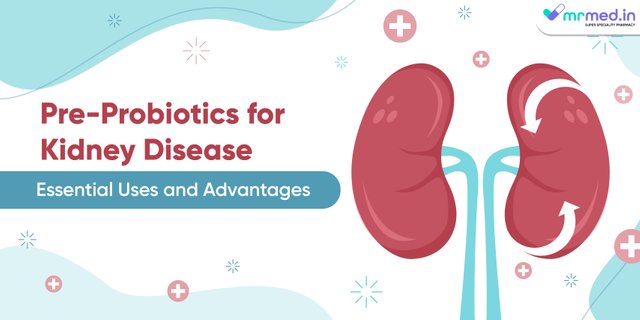Pre-Probiotics for Kidney Disease: Essential Uses and Advantages
Kidney disease is a growing health concern worldwide, affecting millions of people and significantly impacting their quality of life. Effectively managing kidney disease requires a multifaceted approach, including medication, lifestyle changes, and dietary adjustments. Recently, pre-probiotics have emerged as a promising adjunct therapy for kidney disease, offering several benefits that can help improve patient outcomes.

What do pre-probiotics do?
Pre-probiotics are supplements that combine the benefits of probiotics and prebiotics. Probiotics are live microorganisms that confer health benefits when consumed in adequate amounts, primarily by maintaining a healthy balance of gut microbiota. Prebiotics, on the other hand, are dietary fibres that selectively promote the growth and activity of beneficial bacteria in the gut. Together, they create a favourable environment for gut health, which is increasingly recognised as playing a crucial role in overall health and disease prevention.
Can gut health affect kidneys?
The gut-kidney axis describes the bidirectional relationship between gut health and kidney function. Emerging research suggests that an imbalance in gut microbiota, known as dysbiosis, can contribute to the progression of chronic kidney disease (CKD). Dysbiosis can lead to the production of harmful metabolites and inflammation, which can exacerbate kidney damage. Conversely, CKD can further disrupt gut microbiota, creating a vicious cycle. By improving gut health, pre-probiotics can help break this cycle and support kidney health.
Are probiotics good for kidney disease?
Reduction of Uremic Toxins: One of the primary benefits of pre-probiotics for kidney disease is their ability to reduce uremic toxins. Uremic toxins are harmful substances that accumulate in the blood due to impaired kidney function. These toxins can cause various symptoms and complications associated with CKD. Pre-probiotics can help reduce the production and absorption of these toxins by promoting a healthy gut microbiota, enhancing the metabolism and elimination of these toxins from the body.
Improved Gut Health: CKD often leads to an imbalance in gut bacteria, known as dysbiosis. This imbalance can result in increased intestinal permeability, also known as "leaky gut," which allows harmful substances to enter the bloodstream and contribute to inflammation. Pre-probiotics can help restore a healthy balance of gut bacteria, improving gut barrier function and reducing inflammation, which is beneficial for kidney health.
Enhanced Immune Function: A healthy gut microbiota plays a crucial role in supporting the immune system. By maintaining a balanced gut microbiota, pre-probiotics can help improve immune function, protecting against infections and inflammation that can exacerbate kidney disease. This is particularly important for individuals with CKD, who are at increased risk of 4. infections due to their compromised immune function.
Reduced Inflammation: Inflammation is a common issue in CKD and contributes to its progression. Chronic inflammation can damage kidney tissues and impair their function. Pre-probiotics can help reduce systemic inflammation by promoting a balanced gut microbiota, which can produce anti-inflammatory compounds and modulate the immune response. This can help slow the progression of CKD and improve patient outcomes.
Lower Blood Pressure: Hypertension, or high blood pressure, is both a cause and a consequence of CKD. Managing blood pressure is essential for preventing further kidney damage. Some studies suggest that pre-probiotics can help lower blood pressure by improving gut health and reducing inflammation. This can have a beneficial effect on kidney function and overall cardiovascular health.
How to incorporate pre-probiotics into your routine?
Consultation with Healthcare Providers: Before starting any new supplement, including pre-probiotics, it is important to consult with a healthcare provider, especially for individuals with kidney disease. Healthcare providers can guide the appropriate type and dosage of pre-probiotics based on individual health needs and conditions.
Dietary Sources: Incorporating foods rich in probiotics and prebiotics into the diet can be a natural way to support gut health. Probiotic-rich foods include yoghurt, kefir, sauerkraut, kimchi, and other fermented foods. Prebiotic-rich foods include garlic, onions, leeks, asparagus, bananas, and whole grains. A balanced diet that consists of these foods can help maintain a healthy gut microbiota and support kidney health.
Supplementation: In managing kidney disease, incorporating supplements such as pre-probiotics can be highly beneficial. Pre-probiotic capsules provide essential support for gut health, which is crucial for overall kidney function. Products like Awaytox 45mg Capsule [https://www.mrmed.in/medicines/awaytox-45mg-capsule-10s] containing Awaytox offer a potent combination of prebiotics and probiotics.
How do pre-probiotics help in kidney disease management?
Pre-probiotics play a supportive role in the comprehensive management of kidney disease. While they are not a cure, they can complement traditional treatments and lifestyle modifications to enhance overall health and kidney function. Here are some ways pre-probiotics can be integrated into kidney disease management:
Adjunct to Medication: Pre-probiotics can be used as an adjunct to medication prescribed for CKD. By improving gut health and reducing inflammation, pre-probiotics can enhance the effectiveness of drugs and reduce their side effects. It is important to discuss the use of pre-probiotics with a healthcare provider to ensure they are safe and appropriate to use alongside prescribed medications.
Lifestyle Modifications: In addition to taking pre-probiotics, individuals with CKD should adopt a healthy lifestyle to support kidney health. This includes maintaining a balanced diet, staying hydrated, engaging in regular physical activity, managing stress, and avoiding smoking and excessive alcohol consumption. Pre-probiotics can complement these lifestyle modifications by supporting gut health and overall well-being.
Monitoring and Follow-Up: Regular monitoring and follow-up with healthcare providers are essential for individuals with CKD. This allows for the early detection and management of complications and adjustments to treatment plans as needed. Healthcare providers can also monitor the effects of pre-probiotics on gut health and kidney function, ensuring they are providing the desired benefits.
Incorporating pre-probiotics into the management of kidney disease can offer several benefits, including reducing uremic toxins, improving gut health, enhancing immune function, reducing inflammation, and lowering blood pressure. It is important to consult with healthcare providers before starting any new supplement and to adopt a holistic approach to kidney disease management.